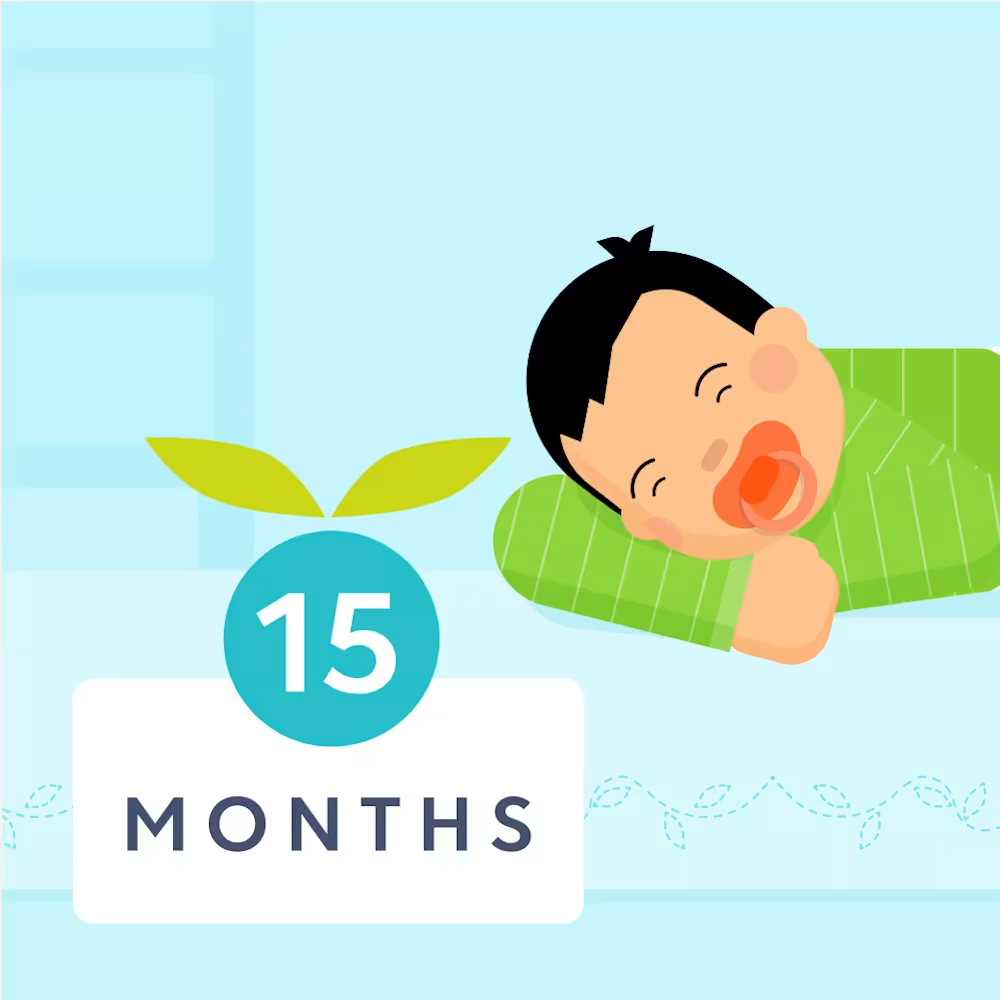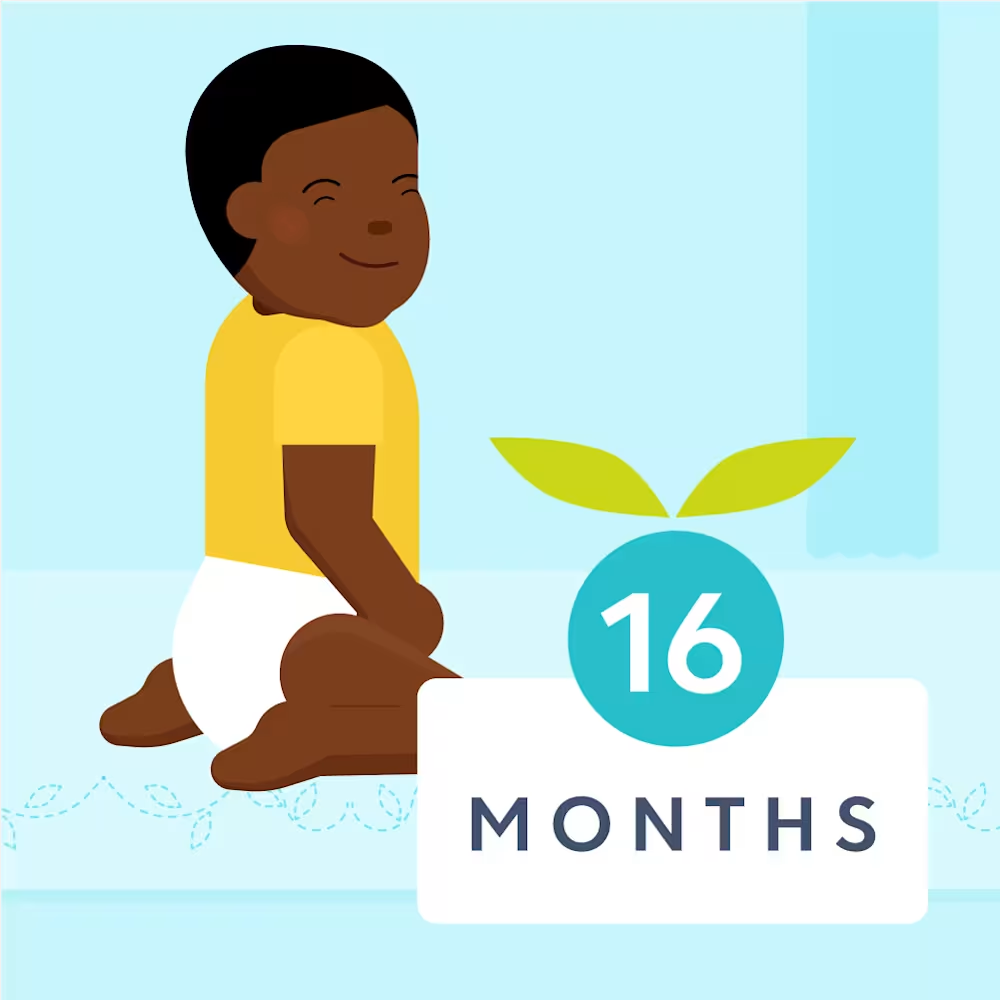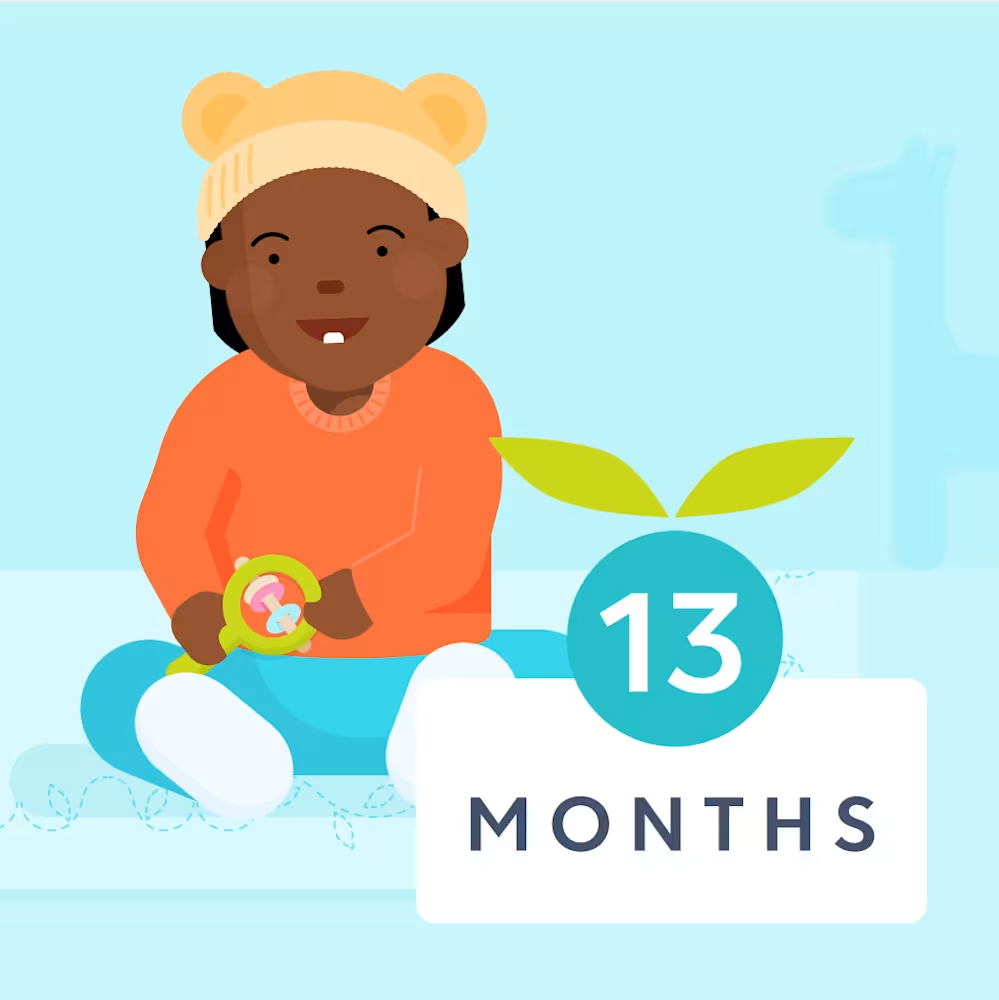14 month old sleep schedule: Bedtime and nap schedule
Updated Dec 15, 2025
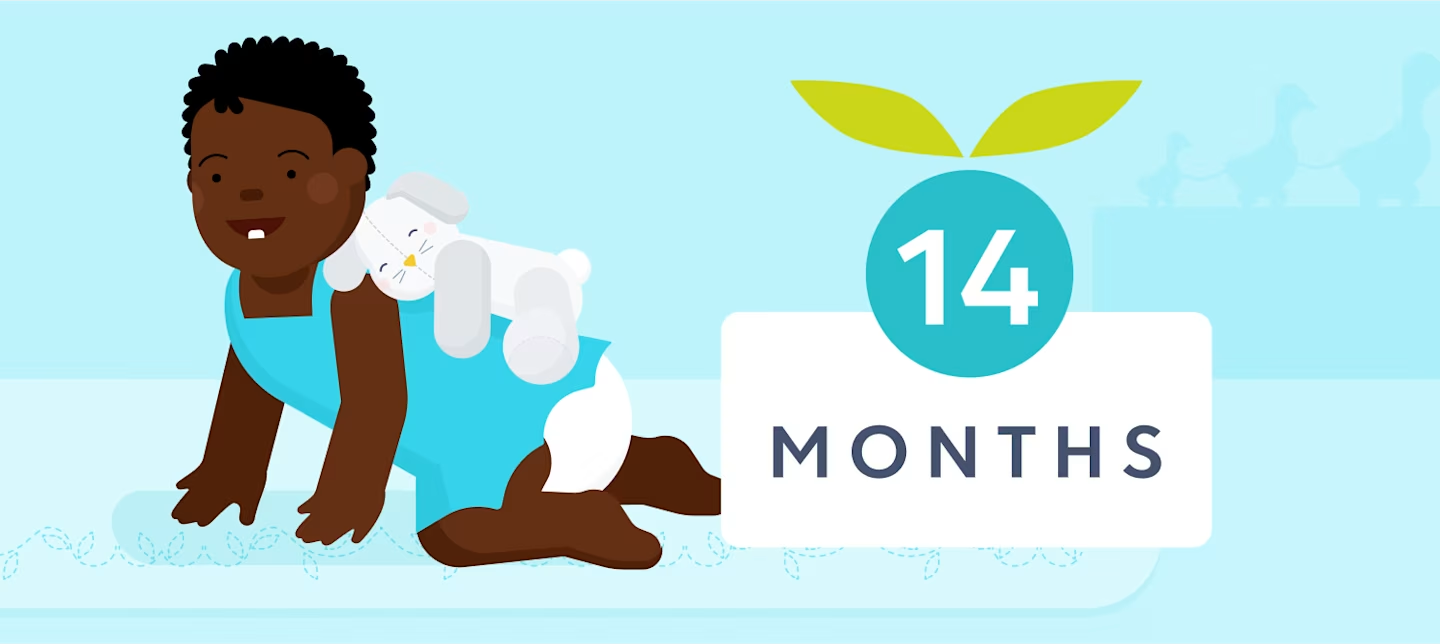
Just when you’ve got your little one’s sleep schedule figured out, they may throw you another curve ball. Around 14 months, your child may show signs of needing another nap transition — or not! Some babies are ready for a 1-nap schedule at this age, while others will hold onto that second nap for another few months. This period can be rather confusing as you try to figure out if they’re truly ready to transition to 1 nap and how to adjust bedtime accordingly.
In this article, we’ll help you navigate your 14 month old’s sleep schedule, give you tips for nap transitions, and let you know how to build healthy sleep habits even during periods of bumpy sleep.
How much should a 14 month old sleep?
At this age, we recommend aiming for about 13.25 hours of sleep. This includes around 11 hours of nighttime sleep and 2 - 3 hours during the day, split between 1 or 2 naps.
However, baby and toddler sleep needs can be complex and every kiddo is different. These numbers are guidelines so try not to worry about hitting an exact number of hours of sleep per day. It’s just as important to monitor your baby's mood and energy levels to ensure they’re getting the rest they need. Here's a quick overview of what you may expect when it comes to 14 month olds and sleep. Note that these figures are averages and should be used as guidelines.
Top sleep tip for 14 month olds
14 month olds are known for testing boundaries. Offering choices can give your toddler a sense of control at bedtime and make the transition from play to sleep smoother. Presenting choices such as: “Do you want to read the kitty cat book or the truck book?” or, “Would you like to wear your blue pajamas or your red pajamas?” can help make them feel their opinions are valid.
However, continue to set the boundary over the timing of bedtime. Even though they may resist going to bed now and then, enforcing a consistent bedtime routine ultimately provides comfort to 14 month olds — even if they have a funny way of showing it.
Sample 14 month old sleep schedule
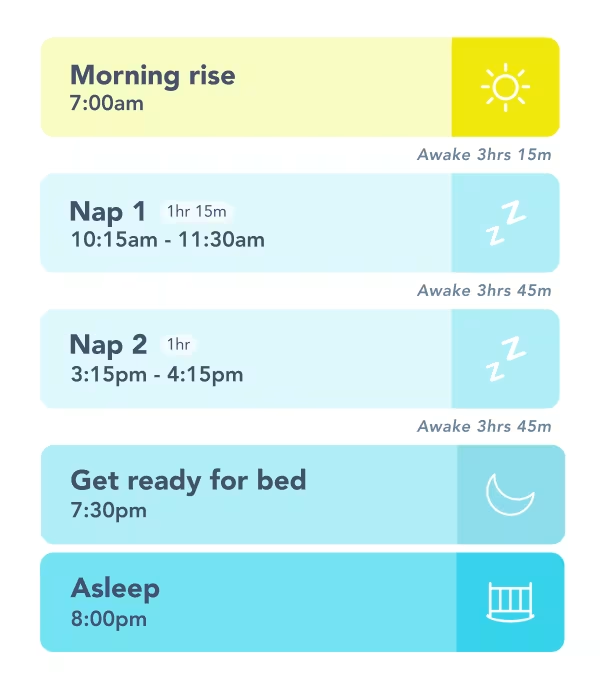
Note: Sleep needs vary by child, and this chart should be viewed as an example.
Morning rise: 7:00 AM
Wake window before first nap: 3.25 hours
First nap: 10:15 - 11:30 AM (1.25 hour nap)
Wake window before second nap: 3.75 hours
Second nap: 3:15 - 4:15 PM (1 hour nap)
Get ready for bed: 7:30 PM
Wake window before bedtime: 3.75 hours
Asleep: 8:00 PM
Naptime schedule for a 14 month old
How many naps for a 14 month old?
At 14 months, some little ones may take 2 naps per day while others have transitioned to a 1-nap schedule. The 2-1 nap transition often occurs between 14 - 18 months. If your little one has dropped to a 1-nap schedule, they’ll need approximately 5 hours of awake time between sleep periods in order to be tired, but not too tired. Children still taking 2 naps per day should have approximately 3.25 hours of awake time before their morning nap and about 3.5 - 3.75 hours of awake time before their afternoon nap.
If your child is still doing well on a 2-nap schedule, there’s no need to rush the transition. Dropping a nap too early can lead to irritability and chronic overtiredness.
Signs that your child is ready to drop a nap include:
Very short naps
Resisting 1 or both naps
Consistently sleeping less than 10 hours a night
How long should a 14 month old nap?
Children who are on a often sleep for a solid 2 - 3 hours. (However, it may take a few weeks for the nap to lengthen right after they drop the second nap.) While still taking per day, a 14 month old’s naps may be 1 - 2 hours each. If you find bedtime is being pushed very late or sleep is shortened because your little one is taking an extra long afternoon nap, consider capping individual naps at 2 hours.
Here are samples for a 1- and 2-nap schedule at 14 months:
2-nap schedule
1-nap schedule
Bedtime for a 14 month old
Timing bedtime can be tricky at this age! And mistiming bedtime can often cause issues when it’s time to sleep []. If your little one isn’t tired enough at bedtime, this can lead to stalling or difficulty falling asleep. On the other hand, overtiredness usually results in tears at bedtime and trouble staying asleep. At this age, “sleepy cues” tend to become less reliable because 14 month olds may not show that they’re tired, even when they are.
While you’ll want to take obvious sleepy cues into consideration, aim for a fairly consistent bedtime as much as possible to help regulate your child’s internal clock (aka circadian rhythm), as this leads to better sleep overall. You’ll also want to consider how long they’ve been awake when determining the best bedtime. A consistent bedtime can be tricky though if they’re in the midst of a nap transition. On days when naps are short or skipped, you can offer an earlier bedtime (but no earlier than 6:00 PM) to limit overtiredness.
If your little one took a long second nap that day, they may not be ready for bedtime at their typical time. Some families find it’s better to wake a child up in order to prioritize a consistent bedtime. At this age, they probably need 3.5 - 4 hours of awake time before bedtime to feel tired enough to sleep. Bedtime routines tend to be a bit longer (30 - 45 minutes) and should allow sufficient time for your child to unwind []. Make the 30 minutes before bedtime calm and relaxing by reading stories and singing.
What time should a 14 month old go to bed?
To allow for sufficient sleep overnight, aim for a bedtime around 12 - 13 hours after your child has woken up for the day. Also, consider the number and durations of naps that day. Many 14 month olds will be ready for bed between 7:00 PM and 8:00 PM, or earlier on 1-nap days. A bedtime before 9:00 PM is generally best for a toddler’s body clock.
Why does my 14 month old keep waking up at night crying?
At 14 months, there are various reasons why your kiddo may be waking up at night when they had previously been sleeping through. Common contributing factors include:
Falling asleep with assistance and desiring the same support overnight
Dropping to 1 nap prematurely
Needing a schedule adjustment
Mastering milestones
Hunger
If you’re looking for more sleep support, consider submitting for a personalized, step-by-step Sleep Plan via .
Is there a sleep regression at 14 months old?
Sleep regressions can happen at any time! There's no predestined “” that's going to plague your kiddo's sleep the second they turn this age. However, around a child’s first birthday is a common time for them to have new sleep challenges, typically due to evolving sleep needs and working on new milestones (like walking and talking). The good news is that sleep regressions tend to resolve in a couple of weeks if kiddos have a solid sleep foundation.
Can my 14 month old sleep with a pacifier?
At 14 months, pacifiers are handy tools during awake and sleep times. Better yet, your kiddo can likely replace their own paci when it inevitably falls out overnight. A helpful trick is putting a couple in their crib to increase the chances that they’ll easily find one and pop it back — instead of calling out for you to help them do it. Note: Check pacis over time to be sure they haven’t turned color or torn, especially since your child likely has teeth at this age. It’s best to replace old binkies if you see signs of wear and tear.
Can a 14 month old sleep on their stomach or side?
The AAP recommends always placing your baby on their back for sleep []. However, it’s OK to let a 14 month old sleep on their stomach or back if they got into the position on their own and they can roll both ways on their own (front to back and back to front). Letting your little one find their own comfortable sleep position is normal at this age.
Can I sleep train a 14 month old?
If you’re looking to remove a parent-led sleep association , sleep training is a way to teach your child to fall asleep on their own. There are various methods of sleep training — “cry it out” isn’t the only . Some techniques are more gradual while others are faster and prioritize results. Caregivers should decide which method fits their family.
What are the developmental milestones for a 14 month old?
What are generally working on? Here’s a checklist of milestones your baby may be trying at this age:
Takes a few steps alone
Attempts to use utensils and drink from a cup independently
Helps with getting dressed
Holds a crayon and begins to scribble after seeing you do it
Turns a single thick page
Says one or two words other than “mama” and “dada”
May say 5 - 10 words
Uses approximations for words (like “ba” for “ball”)
Look at a familiar object after you name it
Understands around 50 words
Points to objects they’re interested in
Does a 14 month old need to eat during the night?
It’s unlikely that your child will need to eat overnight at 14 months. If your kiddo is waking up overnight (or very early in the morning) and you suspect it’s because they’re hungry, try to ensure they’re getting enough calories and physical activity throughout the day. Also, consider when your little one is eating dinner. If their mealtime is on the early side, try moving it a little closer to bedtime or offering a healthy snack before bed.
Takeaway
Some 14 month olds are ready to transition to a 1-nap schedule at 14 months, but many will continue to need 2 naps per day at this age. Children tend to go through the 2-1 nap transition between 14 - 18 months.
Most children at this age will sleep 2 - 3 hours during the day, split between 1 or 2 naps. We recommend aiming for about 13.25 hours of total sleep over 24 hours.
If your kiddo is resisting sleep, many factors may contribute to this rough patch, like needing longer awake periods, being ready to drop to 1 daily nap, teething, and requiring help to fall asleep (and protesting if they don’t receive it).
If you're curious about what lies ahead in the coming month, glimpse into the future to see what you might experience once your baby is on a . Also check out a to see how far your little one has come.
Share article:
Note: The content on this site is for informational purposes only and should not replace medical advice from your doctor, pediatrician, or medical professional. If you have questions or concerns, you should contact a medical professional.
3 Sources
Share article:


